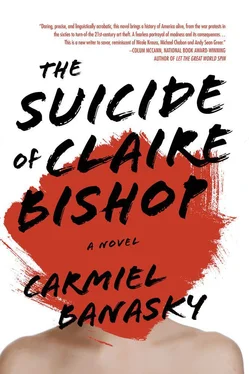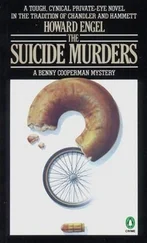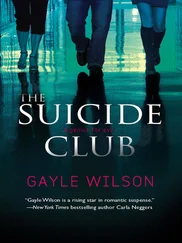But I know why she didn’t tell me the big news: Jules is afraid of me.
I get the feeling I won’t be seeing much of her for a while.
I was walking along a narrow path toward the bluff — this was years ago, back at home on the West Coast — when wildflowers on either side caved in toward my feet, trapping me. A dozen yards away was the edge of the bluff, then the sea. The gangly grass in my foreground.
And then there was the girl. She was standing on the overhang, wavering like the tall grass I saw her through. She was leaning over, looking down at the sea and rocks hundreds of feet below. What was she doing so close to the edge? But I wasn’t afraid. I knew there must be a reason and that the wildflowers knotting near my feet were trapping me where I was for my own protection. I felt a kind of kinship with the path, like it was my brother, or it was me. Since I couldn’t go any farther, I admired the view and the girl from where I was.
I couldn’t see who she was from the back, but something about her was familiar. Her dark hair whipped in the breeze. My chest pounded double-time. But the wildflowers would not let me move to her. I didn’t call out. I couldn’t, though she probably wouldn’t have heard me over the wind anyway. The wildflowers dripped from my brow. Something inside me was rousing from a long sleep, awakened by a twang that said home. And then she jumped.
I told Jules and my mom, and they made me tell the police. The entire town was watching as the boats trolled the waters by the bluff, searching for the remains of the girl. A man, scrubby and worn down with booze, came forward saying he couldn’t find his daughter — a girl from my school whose name I can’t remember — and I was questioned some more. What did you see? A girl with black hair. What did you see? Nothing! I missed school and spent days at the police station, an officer with eyes the color of the shaded sea, leaning his face so close I would have thought he was trying to kiss me if it had been any other room or reason. They felt sorry for me, or they didn’t believe what I saw. No one ever found the body. Washed out to sea, I guess. Or maybe she flew away.
And that’s when I met Nicolette. I wasn’t there, on the Puget Sound in spring, but I was in the moment of that memory when I met her in New York, on Clinton Street, next to the car lots. She’d busted the front tire of her bike and was frowning over it. The chain gates and barbed wire that kept the towed cars caged did the same work the flowers did on the bluff. They made me feel safe, kept from danger. I knew where I was stepping. The world was ready for me.
“Look at me weeping over my tire like this.” She spoke softly but assuredly, smiled when I asked if she needed help. She looked directly in my eyes. “I know you,” she said.
My chest opened like a pair of oiled gates and wildflowers came pouring out. I know she felt it; she was swimming in my flowers.
She said, “Walk with me,” but I didn’t know where we were going. I was nervous and happy. I sweated. My hands ran waterfalls; I almost drowned us. But I walked with her, rolling the bike for her. She smoked a hand-rolled cigarette she’d plucked from her jacket pocket, soiled and foreign-looking in her mouth. And her mouth gaped, the smoke escaping, the same smoke from the fires I’d lit in my childhood bathtub — it was an extension of myself, an extension of the sulfurs from the earth. She was so strange, her face shifting in the light from young to old and back to young.
I remember then we walked by a man who was talking to himself — gibberish about the sky and the smell and how they were the very same thing. She said, “You never know if people are nuts anymore or not. Everyone talks to themselves. Blue-toothed.” And I said, “Guess it never mattered who’s what anyway,” because I couldn’t think of anything smarter to say.
Now that I think about it, maybe that didn’t happen on the same day.
She tried to take her bike back but I kept a hold until she gave in and let me keep rolling it for her, not knowing where she was leading us, having to trust her. An insufficient gesture to say I knew: I knew she was the one who would listen to my story, my illness — even though I didn’t know my illness then. She wouldn’t dismiss it or say, “That’s invisible.” She wouldn’t question me because telling my story is survival.
And I could always tell her my story anew. Because I was always meeting Nicolette for the first time.
Look at me being so serious!
But it’s true, it was a serious day. Right there, where we parted in the middle of the sidewalk, I almost swallowed the sky. I felt, meeting her and leaving her, that if I wasn’t careful, I could open wide and the world would suddenly and violently fill me up, and I wouldn’t survive to feel it withdraw.
Mr. Fox, my supervisor, calls me in for a meeting. I stare at the empty chair across from him. It sends a low pulse, but it’s not dangerous. I sit. He smiles at me, condescending. He thinks I have no social skills whatsoever, so I make sure to meet his expectations. Mr. Fox is a bald crocodile of a man who won’t hesitate to use my problem against me. “I need to talk to you, West.” I need to talk to you, West .
Three months ago, Dan got me this job as a data miner for a predictive market firm. All day I sit in front of a computer screen, digging through other people’s virtual trash. The things they didn’t know they never properly threw away. When I lost my last job, I would have done anything. I would have organized and sold someone’s real garbage on the street if they paid me to. Anything not to depend on Jules. That was part of my exit strategy.
And so I search through charts of digital exhaust, consumer behaviors and cross sections of behaviors, frequent buyer purchases at major grocery and department stores and online conglomerates, probing for patterns. Patterns within patterns. Or rather, I tell the computer to do all that. Then I double-check the data and weed out the irrelevancies, making the spreadsheets shine with pure meaning that will predict our consumer future. Then we sell our findings to clients, who in turn determine what next to market. They predict, or decide, what’s to come from the trash I filter. Which means that I am responsible for the future.
And yet the web-based social computing software can do all of that without me. I am redundant. Which no one else knows. Don’t tell. I cannot let Mr. Fox find out. I cannot lose another job.
“I know you’re a smart guy, that’s what everyone says,” Mr. Fox is saying. He waits to see how I’ll react to this news. In reality, the other guys in the office resent me — it makes them feel stupid that a lunatic can do their job. “How have you been lately?”
“Fine, I guess. Great.”
“I mean, how have you been feeling ?”
Sometimes, the search goes deeper. Like spying on eighteen-year-olds posting on MySpace about whether or not they like Pizza Craver — flavored Doritos. Their preferences can be linked to their status in life and therefore other purchasing habits. We know if a consumer is going through a breakup or if they recently switched careers based on the amount of ice cream or ramen purchased. But my bosses are particularly interested in pregnant women in their first and second trimesters, like Jules. It is, hands down, the most profound period in a person’s life — for marketers. It’s when people are most likely to switch brands, vulnerable to any ad campaign you throw at them. Hormones and routines all in flux.
“Your work’s gotten sloppy,” Mr. Fox says. “I don’t want to have to call up Dan and tell him we may have made a mistake. Your sister wouldn’t be happy.”
I think I’m supposed to feel guilty for data mining, but I don’t feel anything about it at all.
Читать дальше












